By Joshua Greenberg
Work+Money, July 26, 2018 —
In a job interview, it’s easy to feel powerless.
Interviews, and the people who conduct them, can be exceptionally intimidating. You’re nervous, and the person questioning you has the power to give or deny you access to something that you want badly, something that could change your life. It is, therefore, understandable if you feel compelled to answer any question posed to you during the interview.
The truth, however, is more complicated.
Interviewers cannot simply ask about any subject they choose, and you don’t have answer the questions or parts of questions that are illegal. Some subjects are almost always illegal for interviewers to touch upon, and doing so could open them, and the companies they represent, up to liability for employment discrimination in a lawsuit.
You can, of course, choose to answer such queries if you feel comfortable doing so. However, if the interviewer continues to pursue an illegal topic and you begin to feel uncomfortable, you don’t have to continue answering.

Interviews, and the people who conduct them, can be intimidating. (Tim Gouw/Unsplash)
Let’s take a look at some illegal interview questions and ways to respond to them.
1) How Many Children Do You Have?
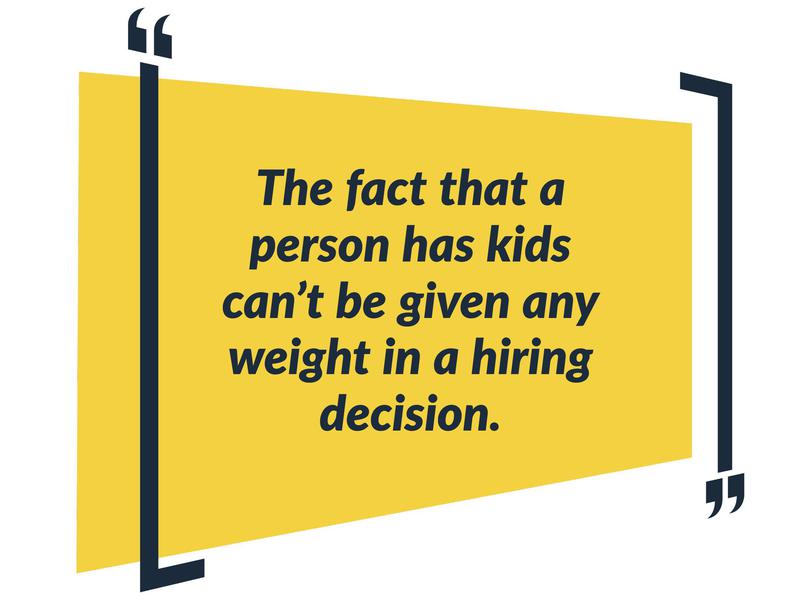
More often than not, an interviewer will ask an illegal question innocently, while trying to get at information that they may legally know. Yet the intent of the question, malicious or not, has no effect on its legality.
When asked an illegal question, your best bet is usually to understand what related information the interviewer is really after and is legally allowed to have, and to answer with that information only. Give them the information they need, even if it isn’t the specific information they asked for.
To begin with, an employer cannot deny a person employment because they have children. They may want to know if other responsibilities in your life will impact your ability to perform your job, and that general information is legal to consider. However, the fact that a person has kids can’t be given any weight in a hiring decision.
If asked this question in an interview, simply state that your life outside of work hasn’t impacted your ability to do past jobs and won’t impact your ability to do the one you’re interviewing for. If the interviewer’s intentions are harmless, this should be enough to get them to move on. If they repeat or rephrase the question, just repeat or rephrase your answer until they drop the subject.
2) Are You Comfortable Managing or Working With a Team of (Other Gender)?
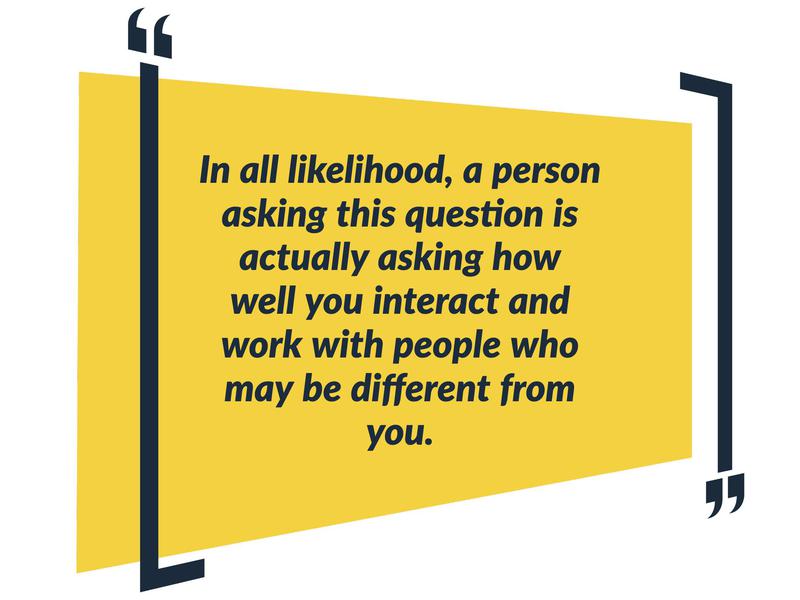
This question is illegal because answering it directly would almost certainly require you to reveal your gender, which interviewers cannot ask you to do. Employment discrimination based on gender is prohibited, and therefore that information cannot be asked for or used in the hiring process.
In all likelihood, a person asking this question is actually asking how well you interact and work with people who may be different from you. Knowing that, simply give examples of how you’ve handled working with teams of diverse backgrounds in the past. You need not state what made the teams diverse. That will not only answer the question without forcing you to reveal your gender, but will give the interviewer some concrete examples of your past experience.
Your answer, in the end, will likely be more helpful to the interviewer than it would have been had you simply answered the original question.
3) What Religious Holidays Do You Observe?
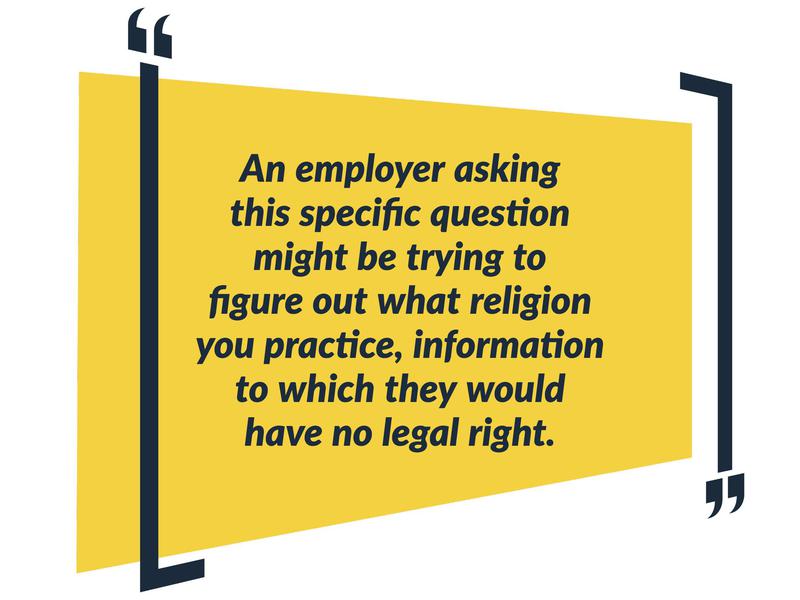
Questions about religion are generally illegal because religion can never be used as a reason to deny someone a job. An employer asking this specific question might be trying to figure out what religion you practice, information to which they would have no legal right.
In this specific case, the interviewer would most likely be trying to figure out how your lifestyle might interfere with your availability to work. The best way to respond to this particular question would be to provide the interviewer with that information exactly. Tell them which days you are available and what hours would work best for you on those days.
You need not explain your availability in any greater detail. With this information in hand, the interviewer will likely move on to another subject.
4) Were You Born in the United States?
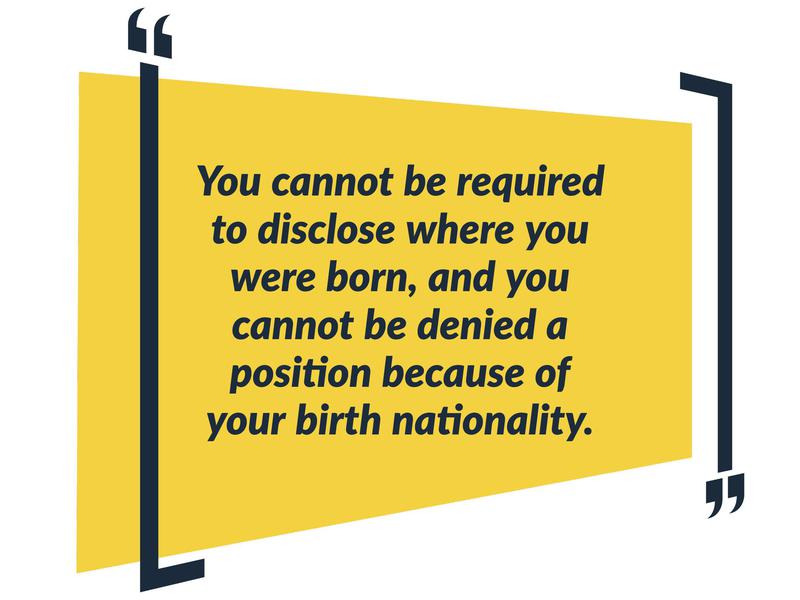
While you must be legally authorized to work in the United States to be eligible for most positions, your nation of birth is protected information. You cannot be required to disclose where you were born, and you cannot be denied a position because of your birth nationality.
Employers don’t need to know where you were born. They simply need to know if you are authorized to work in the U.S. So, if presented with this question, the best way to answer is to state that you are authorized to work here, as long as that’s the truth.
Of course, if you were in fact born here then it does you no harm to answer the question as asked, but it’s best to avoid that anyway. Employers should be discouraged from asking questions like this. If all candidates, regardless of birthplace, refuse to answer, employers will eventually stop asking.
5) Are You Married?
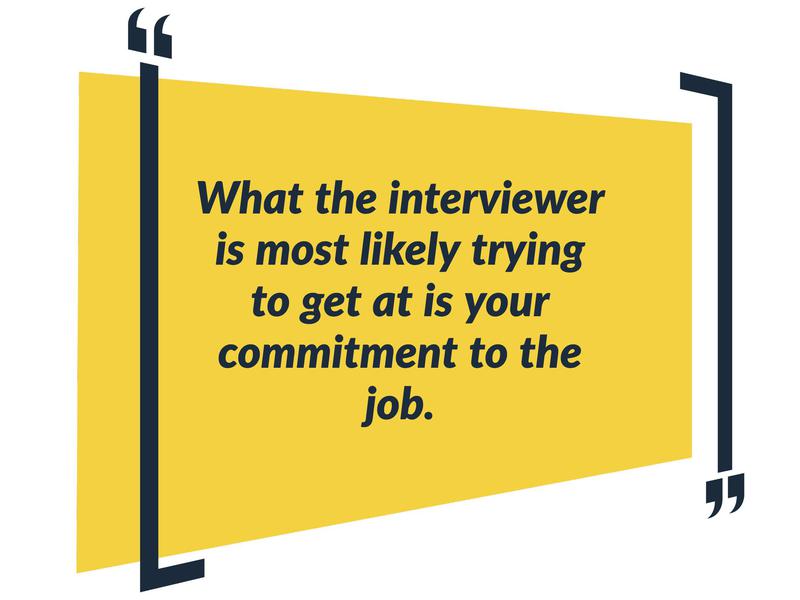
This question, when asked, raises two issues. First, interviewers have no legal right to know or consider marital status. Second, interviewers have no right to know or consider sexual orientation, which could be revealed in an answer to this question. Employment discrimination based on either is illegal.
As with the first question on this list, what the interviewer is most likely trying to get at is your commitment to the job. If asked this question during an interview, you should simply reply that you don’t allow your personal life to interfere with your job performance. You might also state that you don’t let personal commitments and work commitments overlap.
Either answer would provide the interviewer with all the information they could legally consider in a hiring decision even if given a direct answer to the original question.
6) Are You a Native English Speaker?
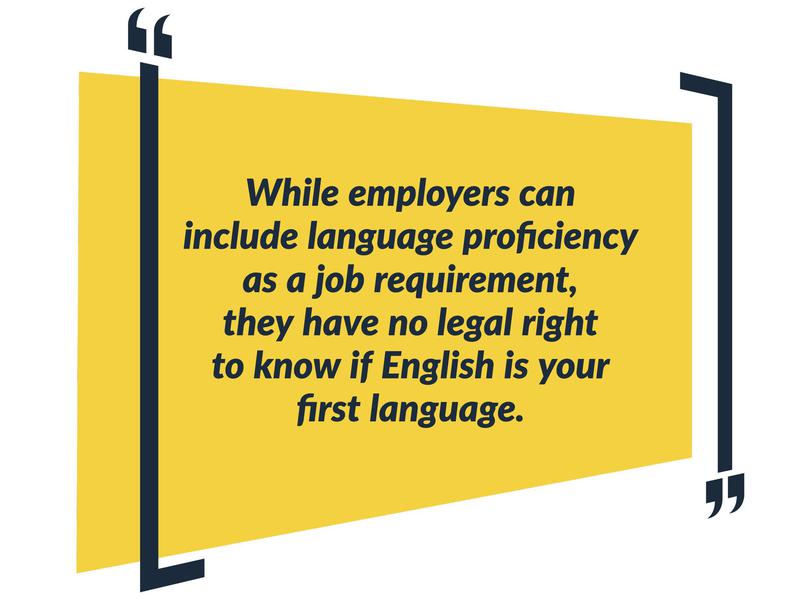
While employers can include language proficiency as a job requirement, they have no legal right to know if English, or any language for that matter, is your first language. Even if proficiency in English is an essential part of the job you are interviewing for, an employer never needs to know if it is your first language and can’t ask if it is.
If English is your first language and you’re asked this question, the easiest way to answer is obviously in the affirmative. However, if you are not a native speaker, or even if you are, you don’t have to provide that particular bit of information.
In order to give the employer the information they need, and are entitled to, without answering the actual question, simply state whether or not you are a fluent reader, writer and/or speaker in the language in question, whether it be English or another. That will tell them what they need to know in terms of the job requirements, but won’t force you to disclose information the interviewer has no legal right to.
7) Do You Drink?
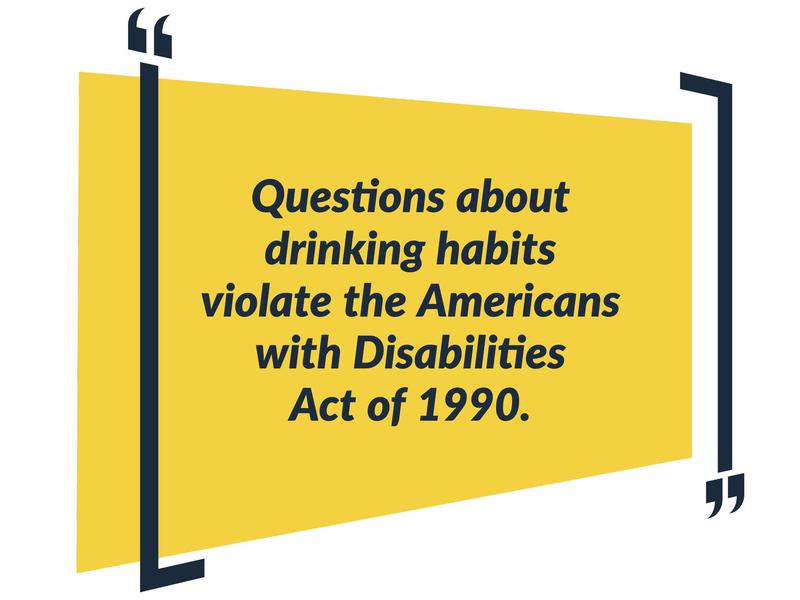
Few people realize that questions about drinking habits violate the Americans with Disabilities Act of 1990. In fact, if you’re asked about it, it may be that your interviewer is unaware that the question is illegal. However, your interviewer may be trying to find out if you are an alcoholic, and that’s a big no-no.
Treatment for alcoholism is protected information, and you cannot be required to disclose it. If asked, you may answer that you drink socially, or however else, if you so choose, but under no circumstances can you be compelled to do so.
As with most illegal questions, the best solution is to answer without answering. You might state that your drinking habits have never affected your work. You might omit the issue of drinking altogether and state that your life or habits outside of work has never affected your work.
However you choose to answer, your drinking habits, past or present cannot factor into the companies decision to extend or deny a job offer.
8) Have You Ever Used Illegal Drugs?

Like your drinking habits, your past drug use or addiction is information protected by the Americans with Disabilities Act of 1990. Drug addiction is a medical condition, and therefore any past illegal drug use is protected by the Act.
Of course, the Act specifically only covers past illegal drug use. If you still habitually use illegal drugs at the time of the interview, the interviewer can legally ask you about that. Current habits that could affect your ability to perform job functions are fair game.
If an interviewer questions you about drug use and you previously used or were addicted to illegal drugs, but are not currently, simply answer by stating that your habits and activities outside of work will not affect your ability to perform in the role you are interviewing for. That will give the company the information it needs to make a decision, while avoiding the information it has no need or right to have.
9) Do You Have Any Disabilities or Serious Illnesses?
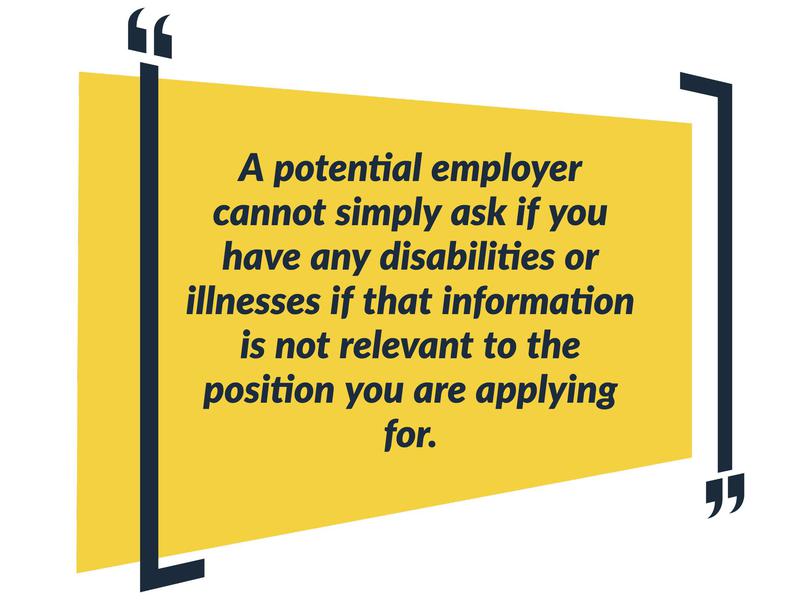
Finally, questions regarding pre-existing illnesses or disabilities are potentially illegal thanks to the Americans with Disabilities Act. A potential employer cannot simply ask if you have any disabilities or illnesses if that information is not relevant to the position you are applying for.
If the job requires a certain level of physical fitness or ability, the interviewer may ask if you have any conditions that would limit your ability to do the job, but even then they cannot ask about disabilities or illnesses in a blanket question without further context.
If asked, and if you don’t have any conditions that could impact job performance, simply state that you are physically able to handle whatever the job might require of you. As with each question on the list, the idea is to get at the information the interviewer actually needs without giving all the information asked for.
10) Are You Comfortable Working With a Boss of Another Race?
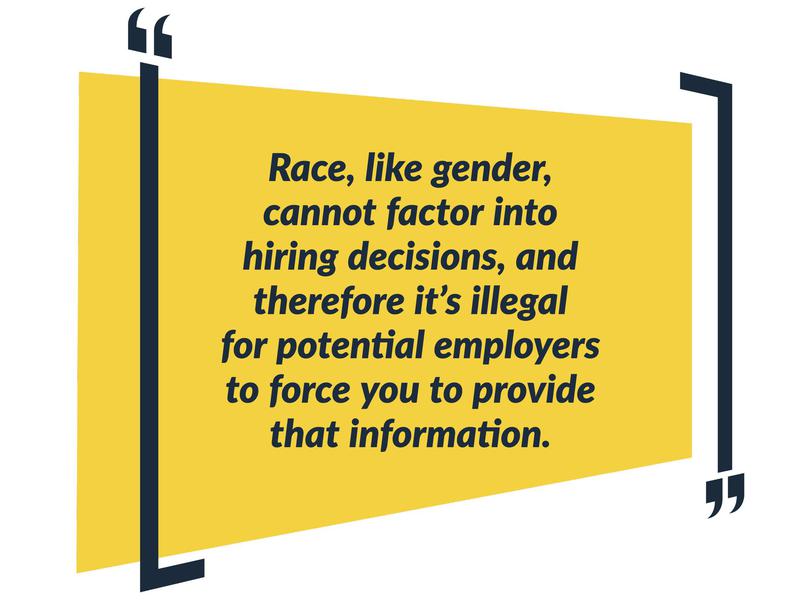
This illegal question is similar to questions about gender. Asking about race is illegal because any question on the subject would almost certainly force you to reveal your race. Race, like gender, cannot factor into hiring decisions, and therefore it’s illegal for potential employers to force you to provide that information.
Your answer to this question, and to questions like it, should be similar to any answer you might give to questions which reference gender. Give concrete examples of how you handled differences of any nature in the past. That will show the interviewer that you can work with anyone while also giving them examples of your work and your problem-solving ability.
Knowing what the interviewer is actually interested in will not only help you get around illegal questions, but will always leave you in a better position than you would have been had you answered in a straightforward manner.
11) Will You Have Trouble Working With People Younger Than You?
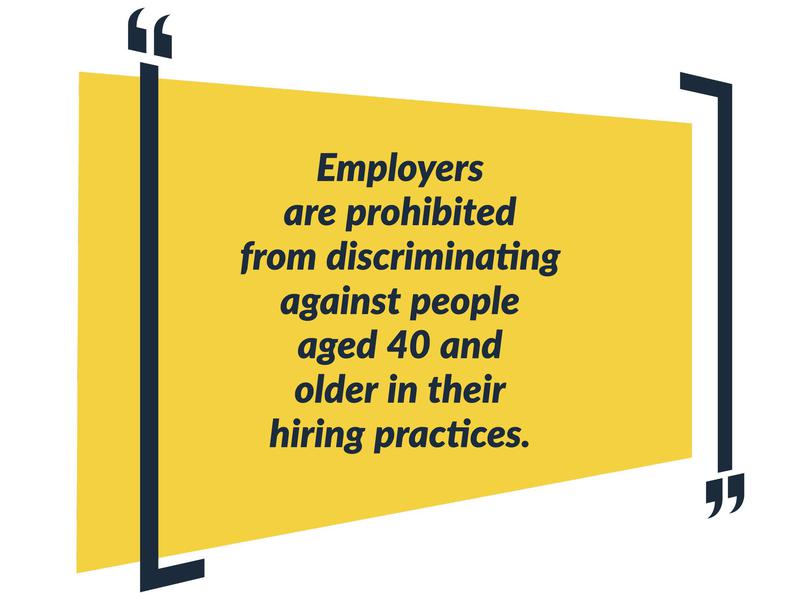
Questions that force you to reveal your age are, in some situations, illegal. Employers are prohibited from discriminating against people aged 40 and older in their hiring practices. Asking a candidate to reveal his or her age, and then using that information when making a hiring decision is, if the person is 40 or older, illegal.
If asked this question or a question like it, you should understand that the interviewer is probably after a couple pieces of information. First, the interviewer likely wants to know how you’ll handle working with people who differ from you. For that, answer like you would to questions about race or gender.
The interviewer also probably wants to know if you’ll be able to quickly master and keep up with any newer technologies the job might require you to use. Instead of revealing your age, give examples of technologies you’ve worked with in the past and your level of proficiency in using them. That will tell the interviewer all they need to know.
12) Are You Pregnant?
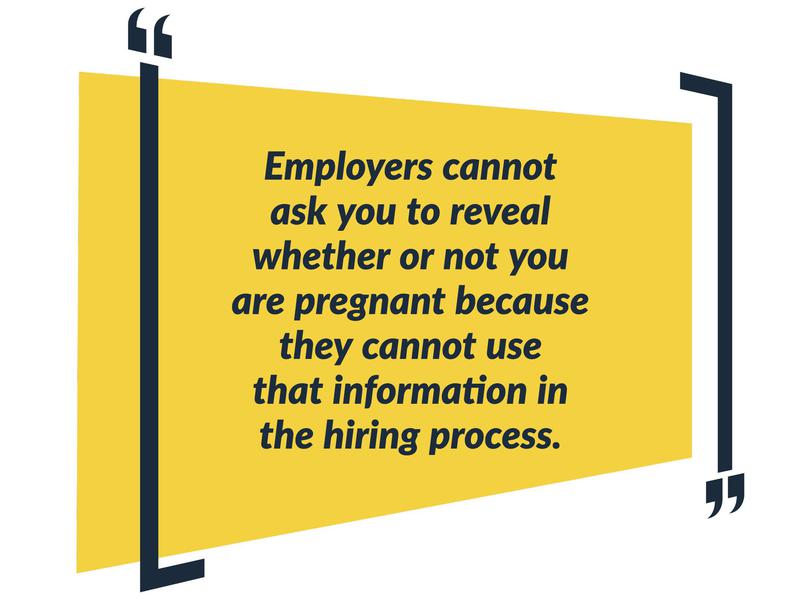
You may not be denied consideration for a position because you are pregnant.
A potential employer can ask how soon you will be able to start working and if you’ll need significant time off soon after starting, but they cannot ask you to reveal whether or not you are pregnant because they cannot use that information in the hiring process.
If an interviewer asks you this question, the best way to respond is to relay the information they need and can use to make a decision. Tell them how soon you’ll be able to start, and tell them if you’ll need extended time off relatively soon after beginning work. If they pursue the subject, don’t be afraid to repeat yourself.











